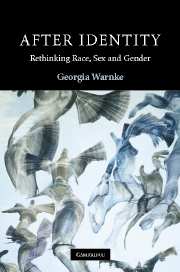Book contents
- Frontmatter
- Contents
- Acknowledgments
- Table of cases
- Introduction: reading individuals
- 1 The tragedy of David Reimer
- 2 Racial identification and identity
- 3 Race and interpretation
- 4 Sex and science
- 5 Rethinking sex and gender identities
- 6 Marriage, the military, and identity
- 7 Hermeneutics and the politics of identity
- Conclusion
- Index
6 - Marriage, the military, and identity
Published online by Cambridge University Press: 22 September 2009
- Frontmatter
- Contents
- Acknowledgments
- Table of cases
- Introduction: reading individuals
- 1 The tragedy of David Reimer
- 2 Racial identification and identity
- 3 Race and interpretation
- 4 Sex and science
- 5 Rethinking sex and gender identities
- 6 Marriage, the military, and identity
- 7 Hermeneutics and the politics of identity
- Conclusion
- Index
Summary
The hermeneutic conditions of sex and gender identities mean that they are intelligible ways of understanding who we are only under certain conditions with regard to specific interpretive wholes. Hence, individuals are men and women in no more or less incidental or unrestricted a way than they are blacks, whites, athletes, or scholars. Acknowledging the incidental character of Irish American identities in the United States went hand in hand with recognizing their lack of significance for social institutions and practices. Sex and gender identities, however, continue to possess significance for and within at least two influential social institutions: the armed forces and civil marriage. Eligibility for service in the military is still understood in terms of sex and gender insofar as men must register for the draft while women must not. Since 1940, however, public opinion has favored drafting women when men are drafted and even to many of those who support women's exemption, the justification for the exemption is less than compelling. What has been thought to be more compelling is an understanding of individuals as men and women for purposes of limiting service in the military to heterosexuals. Since heterosexuals are those who engage in sexual activity with individuals who possess a different sex and gender identity from their own, the armed services must identify their service members and recruits in sex and gender terms. A similar understanding of individuals holds for the institution of civil marriage.
- Type
- Chapter
- Information
- After IdentityRethinking Race, Sex, and Gender, pp. 188 - 222Publisher: Cambridge University PressPrint publication year: 2008

